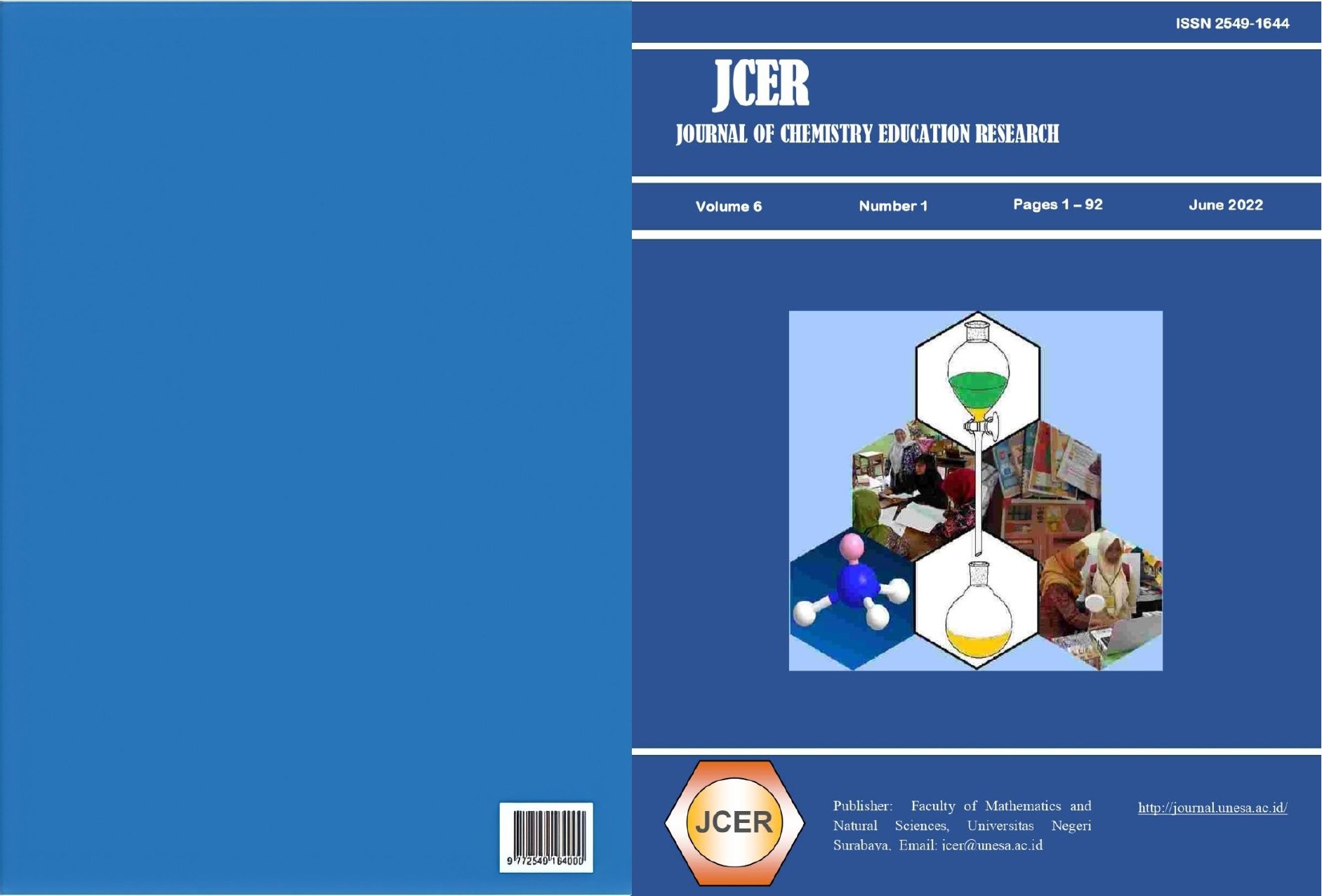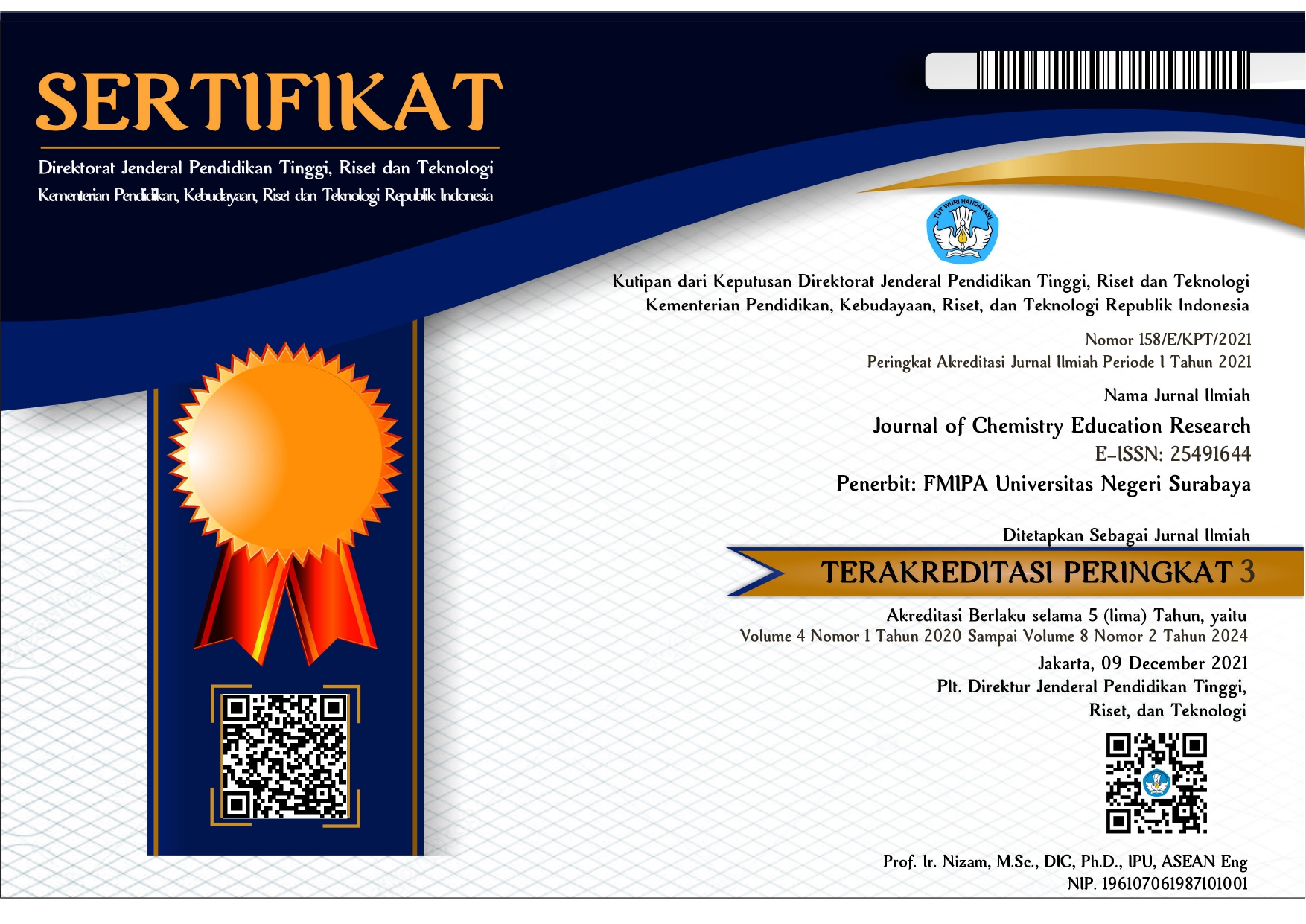VALIDITY OF LEARNING MEDIA IN REACTION RATE MATERIAL
DOI:
https://doi.org/10.26740/jcer.v6n1.p8-13Keywords:
Learning Media, The Validity, Reaction RateAbstract
Abstact.This research is aimed at knowing the validity of learning media in reaction rate matter. The type of research method that is used is ADDIE (Analysis, Design, Development, Implementation and Evaluation) but in this research is limited to Development step. The validation test was conducted by a chemistry lecturer from Unesa by filled the questionnare. The validity of learning media can be scored from construct validity and content validity. Based on the validation result, the construct validity score average is 4.39 which is categorized into very good. The content validity score average is 4.14 which is categorized into good. Based on the validation result, it can be concluded that the learning media was declared to be used as the reaction rate of learning media.
Keywords: Learning Media, The Validity, Reaction Rate
References
Schatzberg, Eric. (2018).Technology and Culture Volume 47. Wisconsin: University of Wisconsin-Madison.
Temkin, O. N; Brouk, L.G; Bonchev D. J. Comput.Chem.1982, 3, 95-110
Effendy. (2010). A Level Chemistry for Senior High School Students Volume 1A.Malang: Bayumedia.
Sastrawijaya, Tresna. (1988). Proses Belajar Mengajar Kimia. Jakarta: Depdikbud Dirjen Dikti PPLPTK.
Manitoba. (2013). Grade 12 Chemistry A Foundation For Implementation. Canada: Manitoba Education.
Rowe, D. (2014). Contemporary media education: ideas for overcoming the
perils of popularity and the theory-practice split. Journal of Media Practice, 5(1): 43-58.
Gray, C. Turner, R. Sutton, C. Patersen, C. Stevens, S. Swain, J. Esmond, B. Schofield, C. Thackeray, D. (2015). Research methods teaching in vocational media education environments: developing critical engagement with knowledge. Journal of Vocational Education & Training 67(3): 274-293. DOI: 10.1080/13636820. 2015.1050443.
Mishra, P., & Koehler, M.J. (2006). Technological Pedagogical Content Knowledge: A Framework for Integrating Technology in Teacher Knowledge. Teacher College Reord. 108(6), 1017-1054.
Anonim. (2019). Laporan Hasil Ujian Nasional.KementrianPendidikandan Kebudayaan.https://puspendik.kemdikbud.go.id. Diaksespadatanggal 08 Oktober 2019 pukul 11.45.
McDougall, J., Potter, J. (2015). Curating media learning:
Towards a porous expertise. E-Learning and Digital Media, 12 (2): 199-211.
Volcic, Z. Erjavec, K. (2006). Becoming Media Literate. Media Education in Slovenia after Ten Years. Journalism & Mass Communiction Educator, 61 (3): 284-296.
Vraga, E.K. Tully, M. (2015). Effectiveness of a Non-Classroom News Media Literacy Intervention Among Different Undergraduate Populations. Journalism & Mass Communication Eduator.71 (4): 440-452.
Bliss, K. (2015). Social Media in the Classroom. Pedagogy in Health Promotion,
(4): 186-193.
Latief, Adnan, Muhammad. (2009). Penelitian Pengembangan. Jurnal Universitas Negeri Malang. Vol 22(1-29).
Branch, Robert M. (2009). Instructional Design: The ADDIE Approach. New York: Springer.
Ary, D. (2011). Pengantar Penelitian dalam Pendidikan. Yogyakarta: PustakaBelajar. Barke.
S. Eko Putro Widoyoko. (2009). Evaluasi Program Pembelajaran. Yogyakarta: Pustaka Belajar.
Azhar, Arsyad. (2011). Media Pembelajaran. Jakarta: Raja GrafindoPersada.
Downloads
Published
Issue
Section
License
Copyright (c) 2022 JCER (Journal of Chemistry Education Research)

This work is licensed under a Creative Commons Attribution-NonCommercial 4.0 International License.
 Abstract views: 445
,
Abstract views: 445
, PDF Downloads: 588
PDF Downloads: 588



